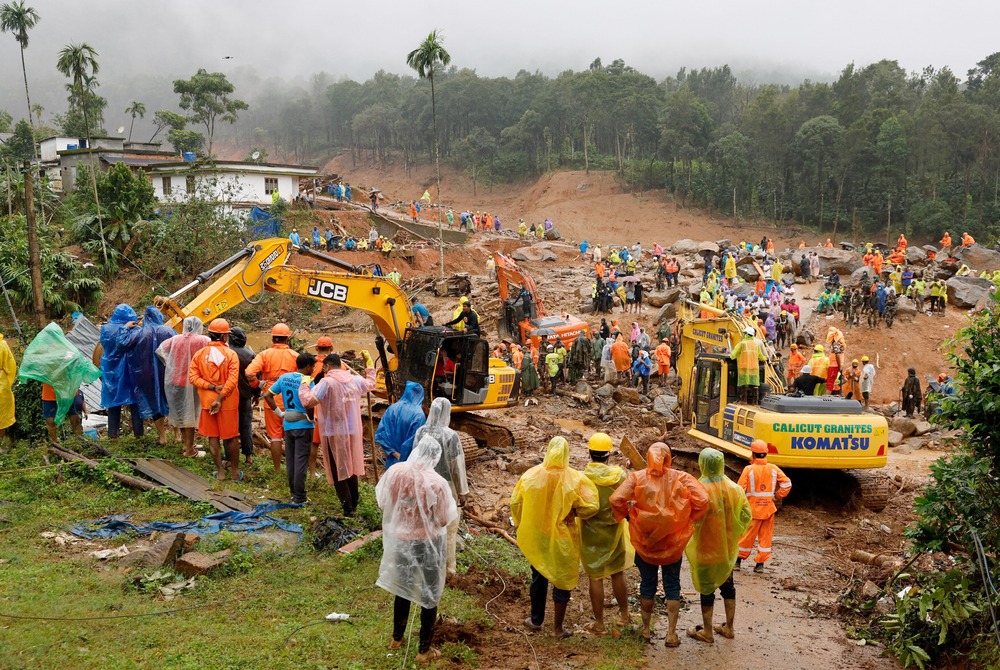
People watch as search operations are carried out in the southern state of Kerala, India, Aug. 1, 2024, following multiple landslides in the hills in Wayanad district. Landslides that hit the Kerala earlier July 30 have killed nearly 200 people. More than 200 people are still missing and some 9,000 people have been moved to relief camps. (OSV News/Francis Mascarenhas, Reuters)
The Indian government is leaving no stone unturned to trace people still missing following the massive landslide in southern Kerala state in the last days of July, while local priests decried a disastrous hygienic crisis in the landslide areas.
"We will continue with the search mission," Kerala local administration minister M.B. Rajesh told UCA News on Aug. 4, five days after the landslide washed away three villages in the hilly Wayanad district.
Some 200 people are reportedly missing after the disaster hit the villages in the Western Ghats area in the morning hours of July 30, when most people slept.
Rajesh took stock of the situation after some 3,000 rescue workers had ended their day’s search for missing persons from places that had vanished without a trace.
The state government pegged the death toll at 222 but media reported as many as 350 casualties.
"Still our priority is to look for people with signs of life," the elite National Disaster Response Force team commander K.R. Naveen told UCA News.
Officials said some 1,500 government agency personnel and an equal number of local volunteers are engaged in searching for bodies and clues about missing persons, including documents and valuables.
Rescue workers retrieved 180 body parts from the mud-covered ruins of the houses.
State officials told media that the government plans to cremate or bury 31 unclaimed dead bodies and 158 body parts on Aug. 5. Clerics from all major religions, including Christians, will offer prayers before the burial.
At least eight unidentified bodies were given a mass burial on Aug. 4 after an interfaith ceremony, with the presence of Christian and Muslim leaders.
Advertisement
The affected villages — Punjrimattom, Mundakkai and Chooralmala — also housed migrant laborers from northern Indian states and many of them are there without legal permission to work.
Migrants mostly worked in the tea and cardamom plantations and in the tourism sector that gathered steam a decade ago in Wayanad.
Officials said massive debris hinders the rescue work. Heavy construction equipment and earth movers can hardly make progress on thick torrents of mud, with rocks and stumps strewn all over.
The police dog squad trained to search for cadavers also often fails to find bodies buried under the debris.
Father Sunny Abraham, parish priest at St. Joseph Church in nearby Meppadi village, said the parish school was turned into a relief camp for nearly 10,000 displaced people.
“Contagious diseases have to be watched for," as bodies are decomposing, he said.
The landslide and the dangers of living in an ecologically sensitive area in Western Ghat are discussed in relief camps and homes.
"It is difficult to get sleep," said 61-year-old Sisly Thomas from Fathima Matha Church in Sindhuguri, a nearby place in Meppadi.
"Young people will take some time to recover from depression," said Father Johnson Kochuparambil, a priest working in the affected areas.
The landslides are the worst to hit the Indian state of Kerala since around 400 people were killed there during floods in 2018. Experts say the construction of hundreds of tourist resorts has increased the risk of natural disasters.




